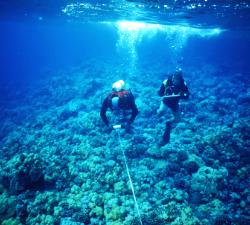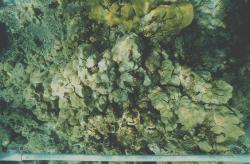|
|
Kealakekua Bay, Hawai'i
Research
| Recent research conducted jointly by the University of Hawaii at Hilo and the Department of Aquatic Resources
(UH-DAR) has focused on the effects of heavy sport diving on reef health. Two 50 m
transects, one located in front of the monument and the other near where the tour boats
anchor, serve as potentially threatened reefs. Two 50 m transects located 100 m south of
the main diving area serve as control reefs. |

|
| The main hypothesis to be tested
is that reefs dived less frequently will exhibit greater coral cover and
less signs of coral damage than reefs subject to intense sport diving (or
non-consumptive use). Sampling methods include 18 photoquadrants of coral
and seaweed cover on each transect and 10 quadrants on each transect for
solitary macroinvertebrates. Each of the four survey areas are sampled
twice a year, with control and treatment pairs being surveyed on the same
day or on successive days. |

|
|
|
